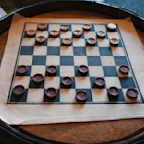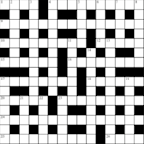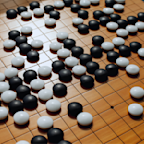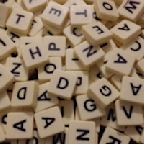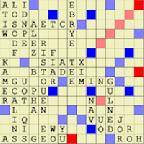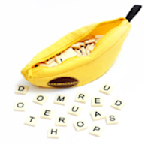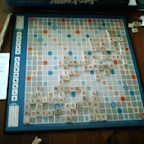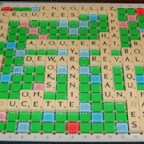Ad
related to: irish version of scrabble
Search results
Results From The WOW.Com Content Network
An Irish-language version of Scrabble was published by Glór na nGael in 2010. The previous year the same organisation published the Junior version of the game and two years later it republished Junior Scrabble using a two-sided (and two skill level) board.
Alongside the English language version of Scrabble the company also produced the first Afrikaans language version of the game under the name Krabbel, an Afrikaans translation of "Scrabble". This language set of the game had the following 100 tiles: 2 blank tiles (scoring 0 points) 1 point: E ×15, A ×9, I ×8, N ×7, O ×6, S ×6, T ×6, R ×5 ...
A game of Snatch in progress. Anagrams (also called Snatch or Snatch-words) is a fast-paced, non-turn-based Scrabble variant played without a board. The tiles are placed face-down in the middle of the table, and players take turns flipping a single tile, leaving it in clear view of all players.
Irish orthography is the set of conventions used to write Irish. A spelling reform in the mid-20th century led to An Caighdeán Oifigiúil, the modern standard written form used by the Government of Ireland, which regulates both spelling and grammar. [1] The reform removed inter-dialectal silent letters, simplified some letter sequences, and ...
Glór na nGael is the Irish publisher of the Scrabble and Junior Scrabble word games, and in 2015 it also published the Irish-language version of the Monopoly board game. Most recently is has published the Irish language version of Cluedo .
- Play Scramble Words Online for Freeaol.com
April 9, 2024 at 4:59 PM. NEW YORK (AP) — Scrabble is getting a bit of a makeover, at least in Europe. Mattel has unveiled a double-sided board that features both the classic word-building game ...
Old Irish, also called Old Gaelic [1] [2] [3] ( Old Irish: Goídelc, Ogham script: ᚌᚑᚔᚇᚓᚂᚉ; Irish: Sean-Ghaeilge; Scottish Gaelic: Seann-Ghàidhlig; Manx: Shenn Yernish or Shenn Ghaelg ), is the oldest form of the Goidelic/Gaelic language for which there are extensive written texts. It was used from c. 600 to c. 900.
Gaelic type (sometimes called Irish character, Irish type, or Gaelic script) is a family of Insular script typefaces devised for printing Classical Gaelic. It was widely used from the 16th century until the mid-18th century in Scotland and the mid-20th century in Ireland, but is now rarely used. Sometimes, all Gaelic typefaces are called Celtic ...
The Irish Times, referring to his analysis published in the Irish language newspaper Foinse, quoted him as follows: "It is an absolute indictment of successive Irish Governments that at the foundation of the Irish State there were 250,000 fluent Irish speakers living in Irish-speaking or semi Irish-speaking areas, but the number now is between ...
The four close vowel phonemes of Irish are the fully close /iː/ and /uː/, and the near-close /ɪ/ and /ʊ/. Their exact pronunciation depends on the quality of the surrounding consonants. /iː/ is realized as a front [iː] between two slender consonants (e.g. tír[tʲiːrʲ] 'country').




